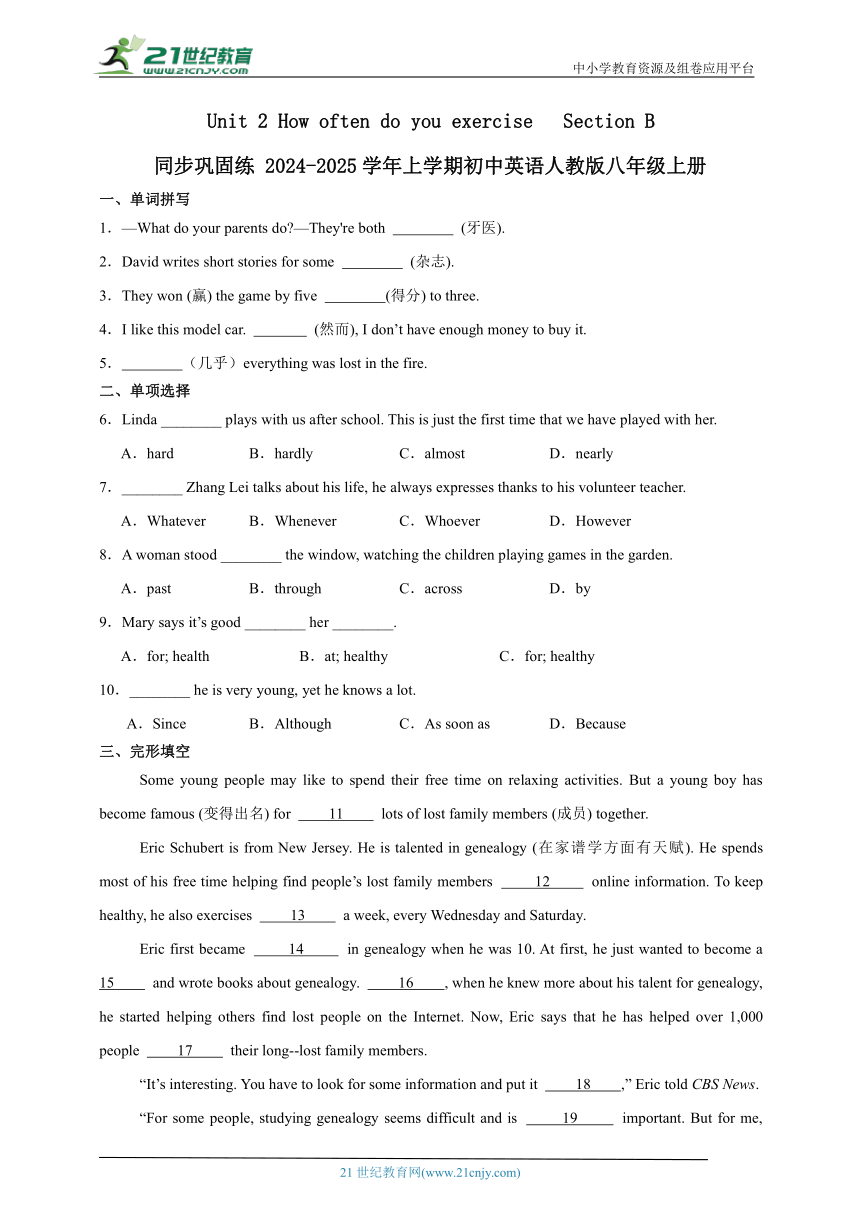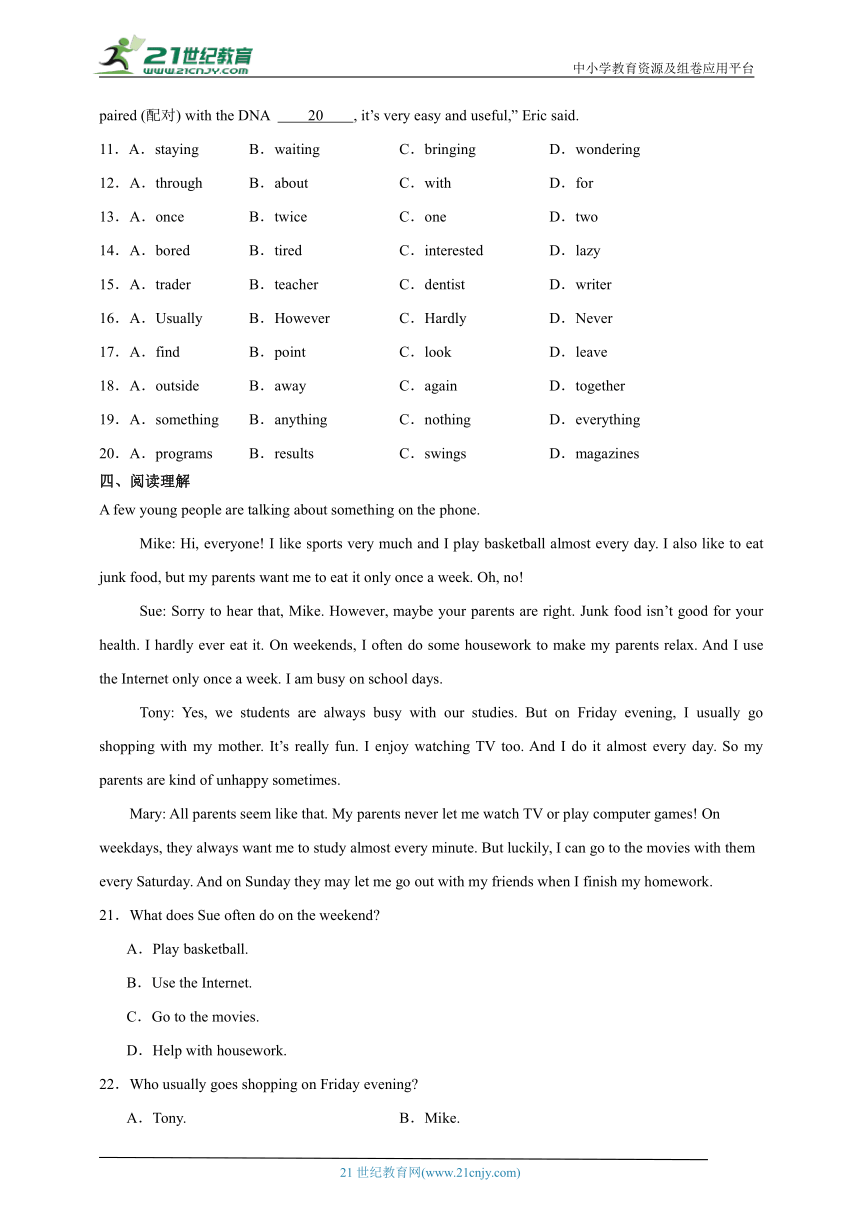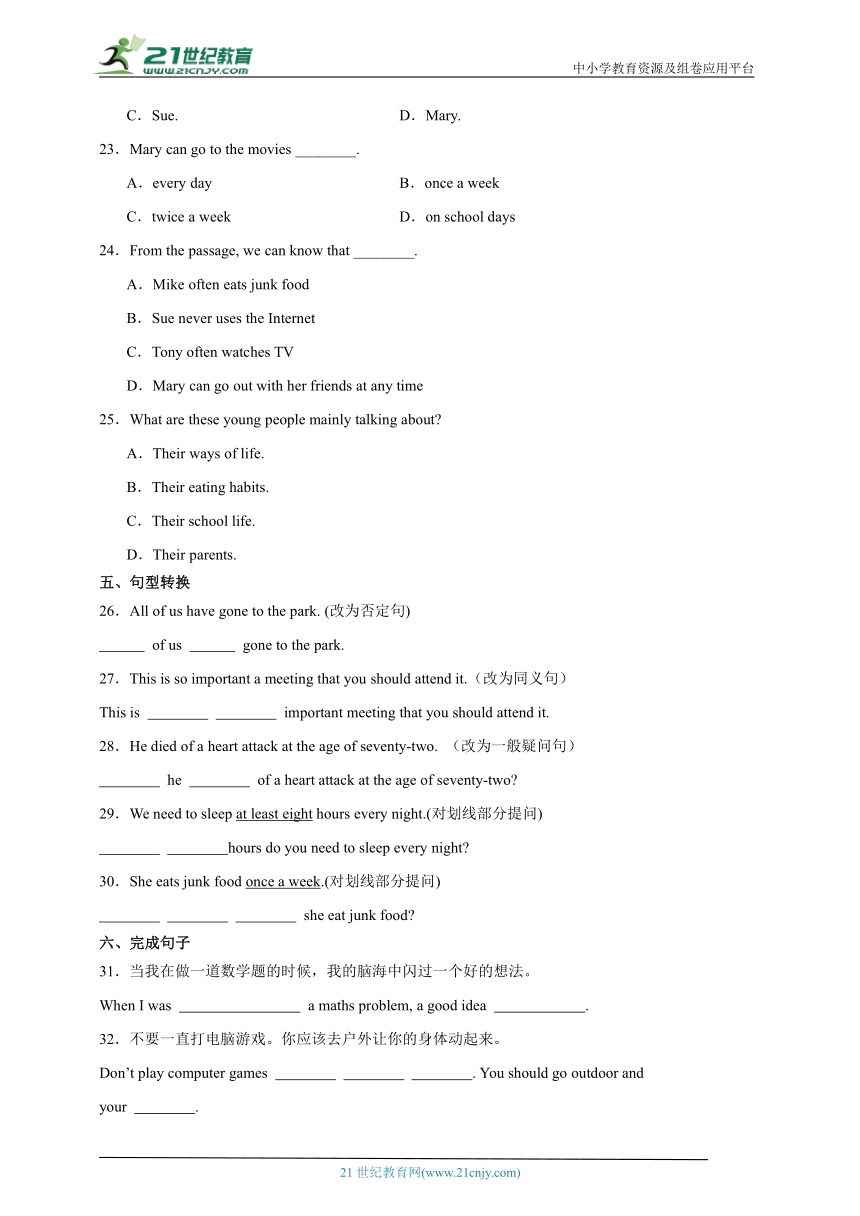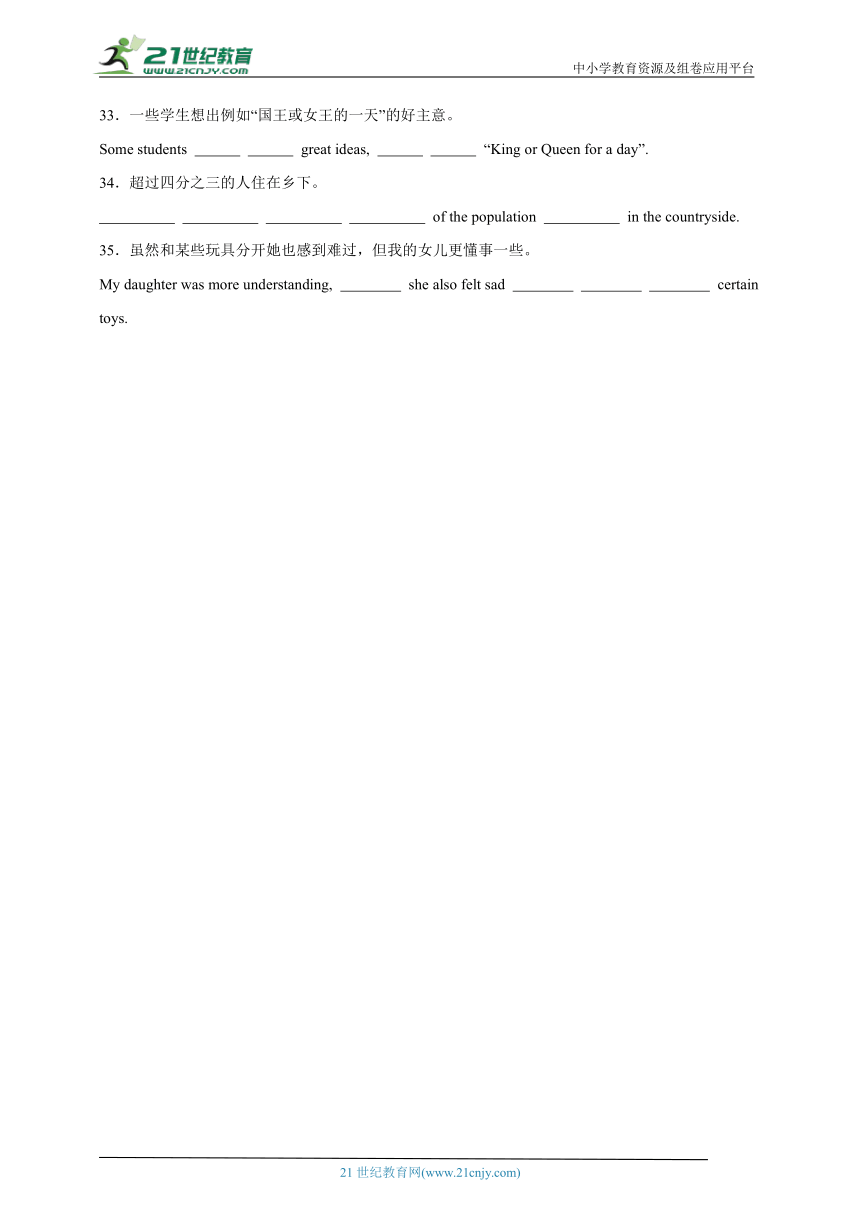Unit 2 How often do you exercise Section B 同步巩固练 2024-2025学年上学期初中英语人教版八年级上册
文档属性
| 名称 | Unit 2 How often do you exercise Section B 同步巩固练 2024-2025学年上学期初中英语人教版八年级上册 |

|
|
| 格式 | docx | ||
| 文件大小 | 49.8KB | ||
| 资源类型 | 试卷 | ||
| 版本资源 | 人教新目标(Go for it)版 | ||
| 科目 | 英语 | ||
| 更新时间 | 2024-11-11 00:00:00 | ||
图片预览




文档简介
中小学教育资源及组卷应用平台
Unit 2 How often do you exercise Section B
同步巩固练 2024-2025学年上学期初中英语人教版八年级上册
一、单词拼写
1.—What do your parents do —They're both (牙医).
2.David writes short stories for some (杂志).
3.They won (赢) the game by five (得分) to three.
4.I like this model car. (然而), I don’t have enough money to buy it.
5. (几乎)everything was lost in the fire.
二、单项选择
6.Linda ________ plays with us after school. This is just the first time that we have played with her.
A.hard B.hardly C.almost D.nearly
7.________ Zhang Lei talks about his life, he always expresses thanks to his volunteer teacher.
A.Whatever B.Whenever C.Whoever D.However
8.A woman stood ________ the window, watching the children playing games in the garden.
A.past B.through C.across D.by
9.Mary says it’s good ________ her ________.
A.for; health B.at; healthy C.for; healthy
10.________ he is very young, yet he knows a lot.
A.Since B.Although C.As soon as D.Because
三、完形填空
Some young people may like to spend their free time on relaxing activities. But a young boy has become famous (变得出名) for 11 lots of lost family members (成员) together.
Eric Schubert is from New Jersey. He is talented in genealogy (在家谱学方面有天赋). He spends most of his free time helping find people’s lost family members 12 online information. To keep healthy, he also exercises 13 a week, every Wednesday and Saturday.
Eric first became 14 in genealogy when he was 10. At first, he just wanted to become a 15 and wrote books about genealogy. 16 , when he knew more about his talent for genealogy, he started helping others find lost people on the Internet. Now, Eric says that he has helped over 1,000 people 17 their long -lost family members.
“It’s interesting. You have to look for some information and put it 18 ,” Eric told CBS News.
“For some people, studying genealogy seems difficult and is 19 important. But for me, paired (配对) with the DNA 20 , it’s very easy and useful,” Eric said.
11.A.staying B.waiting C.bringing D.wondering
12.A.through B.about C.with D.for
13.A.once B.twice C.one D.two
14.A.bored B.tired C.interested D.lazy
15.A.trader B.teacher C.dentist D.writer
16.A.Usually B.However C.Hardly D.Never
17.A.find B.point C.look D.leave
18.A.outside B.away C.again D.together
19.A.something B.anything C.nothing D.everything
20.A.programs B.results C.swings D.magazines
四、阅读理解
A few young people are talking about something on the phone.
Mike: Hi, everyone! I like sports very much and I play basketball almost every day. I also like to eat junk food, but my parents want me to eat it only once a week. Oh, no!
Sue: Sorry to hear that, Mike. However, maybe your parents are right. Junk food isn’t good for your health. I hardly ever eat it. On weekends, I often do some housework to make my parents relax. And I use the Internet only once a week. I am busy on school days.
Tony: Yes, we students are always busy with our studies. But on Friday evening, I usually go shopping with my mother. It’s really fun. I enjoy watching TV too. And I do it almost every day. So my parents are kind of unhappy sometimes.
Mary: All parents seem like that. My parents never let me watch TV or play computer games! On weekdays, they always want me to study almost every minute. But luckily, I can go to the movies with them every Saturday. And on Sunday they may let me go out with my friends when I finish my homework.
21.What does Sue often do on the weekend
A.Play basketball.
B.Use the Internet.
C.Go to the movies.
D.Help with housework.
22.Who usually goes shopping on Friday evening
A.Tony. B.Mike.
C.Sue. D.Mary.
23.Mary can go to the movies ________.
A.every day B.once a week
C.twice a week D.on school days
24.From the passage, we can know that ________.
A.Mike often eats junk food
B.Sue never uses the Internet
C.Tony often watches TV
D.Mary can go out with her friends at any time
25.What are these young people mainly talking about
A.Their ways of life.
B.Their eating habits.
C.Their school life.
D.Their parents.
五、句型转换
26.All of us have gone to the park. (改为否定句)
of us gone to the park.
27.This is so important a meeting that you should attend it.(改为同义句)
This is important meeting that you should attend it.
28.He died of a heart attack at the age of seventy-two. (改为一般疑问句)
he of a heart attack at the age of seventy-two
29.We need to sleep at least eight hours every night.(对划线部分提问)
hours do you need to sleep every night
30.She eats junk food once a week.(对划线部分提问)
she eat junk food
六、完成句子
31.当我在做一道数学题的时候,我的脑海中闪过一个好的想法。
When I was a maths problem, a good idea .
32.不要一直打电脑游戏。你应该去户外让你的身体动起来。
Don’t play computer games . You should go outdoor and your .
33.一些学生想出例如“国王或女王的一天”的好主意。
Some students great ideas, “King or Queen for a day”.
34.超过四分之三的人住在乡下。
of the population in the countryside.
35.虽然和某些玩具分开她也感到难过,但我的女儿更懂事一些。
My daughter was more understanding, she also felt sad certain toys.
参考答案:
1.dentists
根据中文提示,dentist“牙医”,可数名词,系动词are是复数,所以此空应填复数名词,故填dentists。
2.magazines
根据中文提示,magazine“杂志”,可数名词,some修饰可数名词的复数形式,故填magazines。
3.points
point是名词,得分,five是数词,五,后加名词复数形式。故填points。
4.However
however “然而”,是一个副词,表示转折,用在句中前后都要与标点隔开,位于句首首字母要大写,故填However。
5.Almost/Nearly
结合句意和语境可知,此处要用一个副词。“几乎”的英文表达为almost或nearly,由于空格处在句首,故单词的首字母要大写。故填Almost/Nearly。
6.B
考查副词辨析。hard努力地;hardly几乎不;almost几乎;nearly几乎。根据“This is just the first time that we have played with her.”可知这是第一次和她玩,所以她几乎不和我们玩。故选B。
7.B
考查连词辨析。Whatever无论什么;Whenever无论何时,每当;Whoever无论谁;However无论如何。根据“ ... Zhang Lei talks about his life, he always expresses thanks to his volunteer teacher.”可知每当谈到他的生活,总是向志愿者老师表达感谢,用Whenever引导让步状语从句。故选B。
8.D
考查介词辨析。past越过;through穿过;across横穿;by在旁边。根据“stood...the window”可知,此处是短语stand by“站在旁边”,后接地点名词,可知选D。
9.A
考查词义辨析。for对于,为了;at在。此处指对某人的健康有好处,应用介词for。health健康,名词;healthy健康的,形容词。形容词性物主代词her后应用名词health。故选A。
10.B
考查连词辨析。since自从;although虽然,尽管;as soon as一……就……;because因为。根据“he is very young, yet he knows a lot.”可知前后句是转折让步关系,应用although引导让步状语从句,故选B。
11.C 12.A 13.B 14.C 15.D 16.B 17.A 18.D 19.C 20.B
11.句意:但是一个年轻男孩因为把许多失散的家庭成员聚集在一起而变得出名。
staying停留;waiting等待;bringing带来;wondering好奇,想知道。根据“lots of lost family members (成员) together.”可知,是指把许多失散的家庭成员聚在一起,bring ... together“聚集”。故选C。
12.句意:他把大部分空闲时间花在通过网上信息帮助寻找人们失散的家庭成员上。
through通过;about关于;with和;for为了。根据“online information.”可知,是指通过网上信息。故选A。
13.句意:为了保持健康,他还每周锻炼两次,每周三和周六。
once一次;twice两次;one一;two二。根据“every Wednesday and Saturday.”可知,他一周锻炼两次,twice a week“一周两次”。故选B。
14.句意:埃里克10岁时第一次对家谱产生了兴趣。
bored无聊的;tired疲倦的;interested感兴趣的;lazy懒惰的。根据“Eric first became ... in genealogy”可知,是become interested in“对……感兴趣”。故选C。
15.句意:起初,他只是想成为一名作家,写有关家谱的书。
trader商人;teacher老师;dentist牙医;writer作家。根据“wrote books about genealogy.”可知,是想成为一名作家。故选D。
16.句意:然而,当他对自己的家谱天赋有了更多的了解后,他开始在网上帮助别人寻找失散的人。
Usually通常;However然而;Hardly几乎不;Never从不。空前后句是转折关系,用however表示转折。故选B。
17.句意:现在,埃里克说他已经帮助了1000多人找到他们失散多年的家人。
find找到;point指出;look看;leave离开。根据“he started helping others find lost people on the Internet.”可知,是指帮助了1000多人找到他们失散多年的家人。故选A。
18.句意:你必须寻找一些信息并将其组合起来。
outside在外面;away离开;again再,又;together一起。根据“You have to look for some information”可知,是指把这些信息组合在一起。故选D。
19.句意:对有些人来说,研究家谱似乎很困难,也不是什么重要的事情。
something某事;anything任何事;nothing没有什么;everything一切。根据“studying genealogy seems difficult and”可知,是指对有些人而言,研究家谱似乎很难且没有什么重要的。故选C。
20.句意:但对我来说,配对与DNA结果是非常简单和有用的。
programs程序;results结果;swings秋千;magazines杂志。根据“paired (配对) with the DNA”可知,是指配对DNA结果。故选B。
21.D 22.A 23.B 24.C 25.A
21.细节理解题。根据“On weekends, I often do some housework to make my parents relax.”可知,在周末,Sue经常帮父母做家务。故选D。
22.细节理解题。根据“But on Friday evening, I usually go shopping with my mother.”可知,Tony在星期五晚上,通常和他的妈妈购物。故选A。
23.细节理解题。根据“But luckily, I can go to the movies with them every Saturday.”可知,Mary在每个星期六可以去看电影,即一周一次。故选B。
24.细节理解题。根据“I enjoy watching TV too. And I do it almost every day.”可知,Tony喜欢看电视,几乎每天都看。故选C。
25.推理判断题。通读全文可知,本文主要描述了这四个人的喜好以及他们经常做什么事情,故与生活方式有关。故选A。
26. None has/have
all表示三者或以上的全部,改为否定应用none,意为“三者及以上都不”,句首字母需大写;none of后接代词为复数时候,谓语动词可用原形或者第三人称单数形式。故填None;has/have。
27. such an
短语so+adj+a+可数名词单数+that表示“如此……,以至于……”,等同于such+a/an+adj+可数名词单数+that,important是元音音素开头,应用an。故填such;an。
28. Did die
根据died可知题干为一般过去时。由实义动词构成的一般过去时改为疑问句,助动词did提到句首,其后的动词为原形。故填Did;die。
29. How many
划线部分为“at least eight”,是一个数字,对数字提问要用how many;设空处在句首,故how首字母应大写。故填How;many。
30. How often does
划线部分“once a week”表示频率,对频率提问要用how often;再根据特殊疑问句结构“疑问词+一般疑问句”可知,要把原句变一般疑问句;原句含有实义动词“eat”,主语是“she”,变一般疑问句要用助动词does。故填How;often;does。
31. working on went through my mind
work on“从事于;忙于”;根据第一空前的“was”可知,时态为过去进行时,结构为was/were doing,故第一空要用working on;go through“穿过”,表示瞬间动作,结合从句时态,此处动词要用过去式went;my mind“我的脑海”。故填working on;went through my mind。
32. all the time get body moving
all the time“一直”;get your body moving“让你的身体动起来”;and连接并列结构,情态动词后接动词原形。故填all;the;time;get;body moving。
33. think out such as
由汉语和所给的英语翻译可知,“想出”译成:think out;“例如”译成:such as。结合语境分析,这里的时态为一般现在时,主语Some students是复数,因此谓语用动词原形。故填think;out;such;as。
34. More than three quarters/fourths live
“超过”用more than,“四分之三”用分数three quarters或three fourths来表示,结合语境,句子应用一般现在时,“分数/百分数+of+名词”作主语,谓语动词的数由名词来定;当名词the population在此为复数意义,谓语动词用复数,即用动词原形live。故填more;than;three;quarters / fourths;live。
35. although to part with
根据提示,缺少“虽然”为“although”,是一个连词;“和……分开”为“part with”,是一个动词短语;“feel sad to do sth”为“因做某事感到伤心”,系表结构后加不定式,不定式表示原因。故填although;to;part;with。
21世纪教育网 www.21cnjy.com 精品试卷·第 2 页 (共 2 页)
21世纪教育网(www.21cnjy.com)
Unit 2 How often do you exercise Section B
同步巩固练 2024-2025学年上学期初中英语人教版八年级上册
一、单词拼写
1.—What do your parents do —They're both (牙医).
2.David writes short stories for some (杂志).
3.They won (赢) the game by five (得分) to three.
4.I like this model car. (然而), I don’t have enough money to buy it.
5. (几乎)everything was lost in the fire.
二、单项选择
6.Linda ________ plays with us after school. This is just the first time that we have played with her.
A.hard B.hardly C.almost D.nearly
7.________ Zhang Lei talks about his life, he always expresses thanks to his volunteer teacher.
A.Whatever B.Whenever C.Whoever D.However
8.A woman stood ________ the window, watching the children playing games in the garden.
A.past B.through C.across D.by
9.Mary says it’s good ________ her ________.
A.for; health B.at; healthy C.for; healthy
10.________ he is very young, yet he knows a lot.
A.Since B.Although C.As soon as D.Because
三、完形填空
Some young people may like to spend their free time on relaxing activities. But a young boy has become famous (变得出名) for 11 lots of lost family members (成员) together.
Eric Schubert is from New Jersey. He is talented in genealogy (在家谱学方面有天赋). He spends most of his free time helping find people’s lost family members 12 online information. To keep healthy, he also exercises 13 a week, every Wednesday and Saturday.
Eric first became 14 in genealogy when he was 10. At first, he just wanted to become a 15 and wrote books about genealogy. 16 , when he knew more about his talent for genealogy, he started helping others find lost people on the Internet. Now, Eric says that he has helped over 1,000 people 17 their long -lost family members.
“It’s interesting. You have to look for some information and put it 18 ,” Eric told CBS News.
“For some people, studying genealogy seems difficult and is 19 important. But for me, paired (配对) with the DNA 20 , it’s very easy and useful,” Eric said.
11.A.staying B.waiting C.bringing D.wondering
12.A.through B.about C.with D.for
13.A.once B.twice C.one D.two
14.A.bored B.tired C.interested D.lazy
15.A.trader B.teacher C.dentist D.writer
16.A.Usually B.However C.Hardly D.Never
17.A.find B.point C.look D.leave
18.A.outside B.away C.again D.together
19.A.something B.anything C.nothing D.everything
20.A.programs B.results C.swings D.magazines
四、阅读理解
A few young people are talking about something on the phone.
Mike: Hi, everyone! I like sports very much and I play basketball almost every day. I also like to eat junk food, but my parents want me to eat it only once a week. Oh, no!
Sue: Sorry to hear that, Mike. However, maybe your parents are right. Junk food isn’t good for your health. I hardly ever eat it. On weekends, I often do some housework to make my parents relax. And I use the Internet only once a week. I am busy on school days.
Tony: Yes, we students are always busy with our studies. But on Friday evening, I usually go shopping with my mother. It’s really fun. I enjoy watching TV too. And I do it almost every day. So my parents are kind of unhappy sometimes.
Mary: All parents seem like that. My parents never let me watch TV or play computer games! On weekdays, they always want me to study almost every minute. But luckily, I can go to the movies with them every Saturday. And on Sunday they may let me go out with my friends when I finish my homework.
21.What does Sue often do on the weekend
A.Play basketball.
B.Use the Internet.
C.Go to the movies.
D.Help with housework.
22.Who usually goes shopping on Friday evening
A.Tony. B.Mike.
C.Sue. D.Mary.
23.Mary can go to the movies ________.
A.every day B.once a week
C.twice a week D.on school days
24.From the passage, we can know that ________.
A.Mike often eats junk food
B.Sue never uses the Internet
C.Tony often watches TV
D.Mary can go out with her friends at any time
25.What are these young people mainly talking about
A.Their ways of life.
B.Their eating habits.
C.Their school life.
D.Their parents.
五、句型转换
26.All of us have gone to the park. (改为否定句)
of us gone to the park.
27.This is so important a meeting that you should attend it.(改为同义句)
This is important meeting that you should attend it.
28.He died of a heart attack at the age of seventy-two. (改为一般疑问句)
he of a heart attack at the age of seventy-two
29.We need to sleep at least eight hours every night.(对划线部分提问)
hours do you need to sleep every night
30.She eats junk food once a week.(对划线部分提问)
she eat junk food
六、完成句子
31.当我在做一道数学题的时候,我的脑海中闪过一个好的想法。
When I was a maths problem, a good idea .
32.不要一直打电脑游戏。你应该去户外让你的身体动起来。
Don’t play computer games . You should go outdoor and your .
33.一些学生想出例如“国王或女王的一天”的好主意。
Some students great ideas, “King or Queen for a day”.
34.超过四分之三的人住在乡下。
of the population in the countryside.
35.虽然和某些玩具分开她也感到难过,但我的女儿更懂事一些。
My daughter was more understanding, she also felt sad certain toys.
参考答案:
1.dentists
根据中文提示,dentist“牙医”,可数名词,系动词are是复数,所以此空应填复数名词,故填dentists。
2.magazines
根据中文提示,magazine“杂志”,可数名词,some修饰可数名词的复数形式,故填magazines。
3.points
point是名词,得分,five是数词,五,后加名词复数形式。故填points。
4.However
however “然而”,是一个副词,表示转折,用在句中前后都要与标点隔开,位于句首首字母要大写,故填However。
5.Almost/Nearly
结合句意和语境可知,此处要用一个副词。“几乎”的英文表达为almost或nearly,由于空格处在句首,故单词的首字母要大写。故填Almost/Nearly。
6.B
考查副词辨析。hard努力地;hardly几乎不;almost几乎;nearly几乎。根据“This is just the first time that we have played with her.”可知这是第一次和她玩,所以她几乎不和我们玩。故选B。
7.B
考查连词辨析。Whatever无论什么;Whenever无论何时,每当;Whoever无论谁;However无论如何。根据“ ... Zhang Lei talks about his life, he always expresses thanks to his volunteer teacher.”可知每当谈到他的生活,总是向志愿者老师表达感谢,用Whenever引导让步状语从句。故选B。
8.D
考查介词辨析。past越过;through穿过;across横穿;by在旁边。根据“stood...the window”可知,此处是短语stand by“站在旁边”,后接地点名词,可知选D。
9.A
考查词义辨析。for对于,为了;at在。此处指对某人的健康有好处,应用介词for。health健康,名词;healthy健康的,形容词。形容词性物主代词her后应用名词health。故选A。
10.B
考查连词辨析。since自从;although虽然,尽管;as soon as一……就……;because因为。根据“he is very young, yet he knows a lot.”可知前后句是转折让步关系,应用although引导让步状语从句,故选B。
11.C 12.A 13.B 14.C 15.D 16.B 17.A 18.D 19.C 20.B
11.句意:但是一个年轻男孩因为把许多失散的家庭成员聚集在一起而变得出名。
staying停留;waiting等待;bringing带来;wondering好奇,想知道。根据“lots of lost family members (成员) together.”可知,是指把许多失散的家庭成员聚在一起,bring ... together“聚集”。故选C。
12.句意:他把大部分空闲时间花在通过网上信息帮助寻找人们失散的家庭成员上。
through通过;about关于;with和;for为了。根据“online information.”可知,是指通过网上信息。故选A。
13.句意:为了保持健康,他还每周锻炼两次,每周三和周六。
once一次;twice两次;one一;two二。根据“every Wednesday and Saturday.”可知,他一周锻炼两次,twice a week“一周两次”。故选B。
14.句意:埃里克10岁时第一次对家谱产生了兴趣。
bored无聊的;tired疲倦的;interested感兴趣的;lazy懒惰的。根据“Eric first became ... in genealogy”可知,是become interested in“对……感兴趣”。故选C。
15.句意:起初,他只是想成为一名作家,写有关家谱的书。
trader商人;teacher老师;dentist牙医;writer作家。根据“wrote books about genealogy.”可知,是想成为一名作家。故选D。
16.句意:然而,当他对自己的家谱天赋有了更多的了解后,他开始在网上帮助别人寻找失散的人。
Usually通常;However然而;Hardly几乎不;Never从不。空前后句是转折关系,用however表示转折。故选B。
17.句意:现在,埃里克说他已经帮助了1000多人找到他们失散多年的家人。
find找到;point指出;look看;leave离开。根据“he started helping others find lost people on the Internet.”可知,是指帮助了1000多人找到他们失散多年的家人。故选A。
18.句意:你必须寻找一些信息并将其组合起来。
outside在外面;away离开;again再,又;together一起。根据“You have to look for some information”可知,是指把这些信息组合在一起。故选D。
19.句意:对有些人来说,研究家谱似乎很困难,也不是什么重要的事情。
something某事;anything任何事;nothing没有什么;everything一切。根据“studying genealogy seems difficult and”可知,是指对有些人而言,研究家谱似乎很难且没有什么重要的。故选C。
20.句意:但对我来说,配对与DNA结果是非常简单和有用的。
programs程序;results结果;swings秋千;magazines杂志。根据“paired (配对) with the DNA”可知,是指配对DNA结果。故选B。
21.D 22.A 23.B 24.C 25.A
21.细节理解题。根据“On weekends, I often do some housework to make my parents relax.”可知,在周末,Sue经常帮父母做家务。故选D。
22.细节理解题。根据“But on Friday evening, I usually go shopping with my mother.”可知,Tony在星期五晚上,通常和他的妈妈购物。故选A。
23.细节理解题。根据“But luckily, I can go to the movies with them every Saturday.”可知,Mary在每个星期六可以去看电影,即一周一次。故选B。
24.细节理解题。根据“I enjoy watching TV too. And I do it almost every day.”可知,Tony喜欢看电视,几乎每天都看。故选C。
25.推理判断题。通读全文可知,本文主要描述了这四个人的喜好以及他们经常做什么事情,故与生活方式有关。故选A。
26. None has/have
all表示三者或以上的全部,改为否定应用none,意为“三者及以上都不”,句首字母需大写;none of后接代词为复数时候,谓语动词可用原形或者第三人称单数形式。故填None;has/have。
27. such an
短语so+adj+a+可数名词单数+that表示“如此……,以至于……”,等同于such+a/an+adj+可数名词单数+that,important是元音音素开头,应用an。故填such;an。
28. Did die
根据died可知题干为一般过去时。由实义动词构成的一般过去时改为疑问句,助动词did提到句首,其后的动词为原形。故填Did;die。
29. How many
划线部分为“at least eight”,是一个数字,对数字提问要用how many;设空处在句首,故how首字母应大写。故填How;many。
30. How often does
划线部分“once a week”表示频率,对频率提问要用how often;再根据特殊疑问句结构“疑问词+一般疑问句”可知,要把原句变一般疑问句;原句含有实义动词“eat”,主语是“she”,变一般疑问句要用助动词does。故填How;often;does。
31. working on went through my mind
work on“从事于;忙于”;根据第一空前的“was”可知,时态为过去进行时,结构为was/were doing,故第一空要用working on;go through“穿过”,表示瞬间动作,结合从句时态,此处动词要用过去式went;my mind“我的脑海”。故填working on;went through my mind。
32. all the time get body moving
all the time“一直”;get your body moving“让你的身体动起来”;and连接并列结构,情态动词后接动词原形。故填all;the;time;get;body moving。
33. think out such as
由汉语和所给的英语翻译可知,“想出”译成:think out;“例如”译成:such as。结合语境分析,这里的时态为一般现在时,主语Some students是复数,因此谓语用动词原形。故填think;out;such;as。
34. More than three quarters/fourths live
“超过”用more than,“四分之三”用分数three quarters或three fourths来表示,结合语境,句子应用一般现在时,“分数/百分数+of+名词”作主语,谓语动词的数由名词来定;当名词the population在此为复数意义,谓语动词用复数,即用动词原形live。故填more;than;three;quarters / fourths;live。
35. although to part with
根据提示,缺少“虽然”为“although”,是一个连词;“和……分开”为“part with”,是一个动词短语;“feel sad to do sth”为“因做某事感到伤心”,系表结构后加不定式,不定式表示原因。故填although;to;part;with。
21世纪教育网 www.21cnjy.com 精品试卷·第 2 页 (共 2 页)
21世纪教育网(www.21cnjy.com)
同课章节目录
- Unit 1 Where did you go on vacation?
- Section A
- Section B
- Unit 2 How often do you exercise?
- Section A
- Section B
- Unit 3 I'm more outgoing than my sister.
- Section A
- Section B
- Unit 4 What's the best movie theater?
- Section A
- Section B
- Unit 5 Do you want to watch a game show?
- Section A
- Section B
- Unit 6 I'm going to study computer science.
- Section A
- Section B
- Unit 7 Will people have robots?
- Section A
- Section B
- Unit 8 How do you make a banana milk shake?
- Section A
- Section B
- Unit 9 Can you come to my party?
- Section A
- Section B
- Unit 10 If you go to the party, you'll have a grea
- Section A
- Section B
